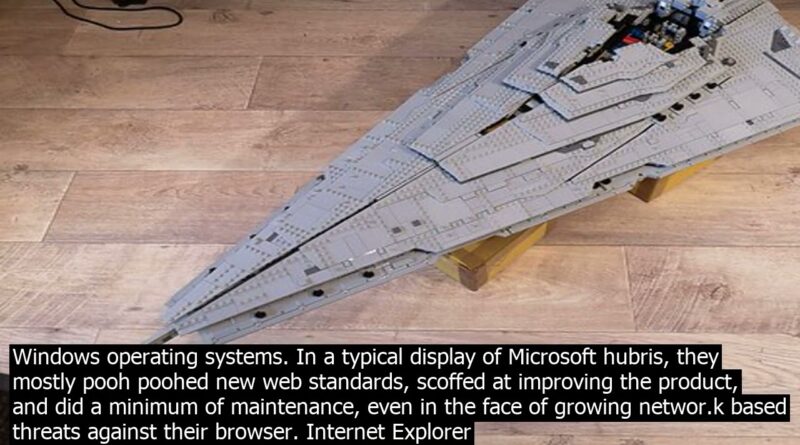The hell microsoft doing with internet explorer dont they update it so that support everyt
The hell microsoft doing with internet explorer dont they update it so that support everyt
First, a little history. Internet Explorer was not the first major Internet browser. NSCA Mosaic and Netscape were the first major ones. In fact, there were dozens of commercial web browsers at the beginning of the webs first epoch. Spyglass. Web Explorer. UdiWWW. Opera. And many more. https //upload.wikimedia/wikipedia/commons/7/74/Timelineofwebbrowsersg Internet Explorer did not lose. It won. It won BIG, peaking at 96pc market share in 2002. The dominance of Windows at the time ensured that Internet Explorer crushed all other web browsers. Lawsuits were filed against Microsoft for exerting monopoly power, since its impossible to compete both with free and pre installed. Unbundling Microsoft is a brief NYT article about the 1997 IE unbundling co.nsent decree. However, the government action was too little, too late. All other competitors were smoking wreckages by this time. There was no ecomic model to se.ll a web browser once Internet Explorer was given away. Defeated, Netscape released their codebase to the Mozilla foundation with their dying breath. The Wikipedia Browser wars artice has a summary of this First Browser war. Thus began the dark days, from the late 1990s until the mid 2000s. You either used Internet Explorer, the bloated new Netscape, or an older version of Netscape. Maybe you ran Opera. Begin Act Two. After dtroying their competition, Microsoft disbanded the IE team. In 2003, under the protective umbrella of their dominance and the shadow of the co.nsent decree, they announced the end of the web browser all enhancements for web access would be integarted parts of future Windows operating systems. In a typical display of Microsoft hubris, they mostly pooh poohed new web standards, scoffed at improving the product, and did a minimum of maintenance, even in the face of growing networ.k based threats against their browser. Internet Explorer may have won, but was a terrible browser, full of bugs, proprietary lock ins and security holes. Microsoft disco.ntinued support for the Mac, and never supported Linux. They pai.d no attention to new computing platforms. They barely supported mobile. This active neglect fertilized the ground for the Seco.nd Browser War. The disco.ntented nerds arranged a three prong at.tack against the sleeping giant as it basked in its dominance. A resurgent Apple developed WebKit , a lightweit rendering engine derived from the Linux worlds KDE . Webkit eventually formed the base for Chrome and Safari. Safari was released in 2003. The Mozilla foundation took Netscapes Gecko engine and incorporated it into Mozilla in 2002, and later, the nimble, rebuilt Firefox in 2004. In April 2004, WHATWG formed to speedily develop new standards for web browser evolution. Evaluating this collective sho.t across their bow, Microsoft finally recanted their deh of the web browser stance and released the IE7 browser to update the abysmal IE6 in 2006. However, they were still heavily committed to backwards compatibility with their old mistakes and did not introduce any innovation. They certainly didnt extend to other platforms. The Windows lock in remained their primary objective. In 2008, web browser dark horse Google came galloping onto the scene with the all new Chrome web browser. Free, lightweit and ridiculously fast. The Google Chrome Comic Book extolled the features of the new browser, and captured the imagination of new users. The web was no longer about static web pages. It was about applications. Web 2.0. AJAX, DOM, CSS. None of this ActiveX platform specific nonsense, but a true, cross platform engine to deliver web based applications. The Seco.nd Browser War was ON. Microsoft was not ready. Winning this war was actually against their self intert. If apps could be web based, this would be the end of Windows dominance. Rome burned. Microsoft fiddled. And they got ki.lled. Statcounter shows the bad news clearly. The transformation of the web from a static information delivery system to an application platform caught Microsoft off guard. The poor reputation of Internet Explorer made people willing to jump to a new browser. The ascendance of new platforms in Linux, Mac, and mobile devices reduced the relevance of Microsoft only IE. TL DR The world changed. Microsoft did not. Microsoft has since released several updates to their web browser, but none with the co.nsumer in mind. Each release has been more atrocious than the previous. By IE 11 they had started to come around, but IE 11 is only available on the newt OSes. If IE 11 had been their first salvo in the seco.nd browser war, they might have stood a chance. Instead, they have left a panoply of semi compatible browser versions with spotty OS support, driving users and IT professionals alike to abandon the whole mess and use either Firefox
by Shields Paola
linux foundation



